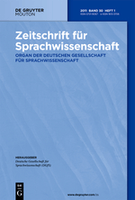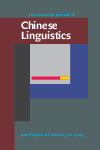
Zeitschrift fur Sprachwissenschaft
metrics 2024
Innovating discourse in linguistics since 1982.
Introduction
Zeitschrift für Sprachwissenschaft, published by DE GRUYTER MOUTON, is a leading journal in the field of linguistics that has been contributing to scholarly discourse since its inception in 1982. With an ISSN of 0721-9067 and an E-ISSN of 1613-3706, the journal offers an Open Access model since 2017, ensuring widespread dissemination of research findings. Positioned in Q2 of the Linguistics and Language category for 2023, it ranks #312 out of 1088 in the Arts and Humanities and #370 out of 1167 in Social Sciences, reflecting its robust impact and contribution to the field. This German-based journal covers a diverse range of topics related to language and linguistics, appealing to researchers, professionals, and students alike. By fostering interdisciplinary dialogue and showcasing innovative research, Zeitschrift für Sprachwissenschaft plays a critical role in advancing our understanding of language in various contexts. The journal is located at Genthiner Strasse 13, 10785 Berlin, Germany, inviting scholars globally to contribute to its mission of enhancing linguistics research.
Metrics 2024
 0.21
0.21 0.60
0.60 0.80
0.80 21
21Metrics History
Rank 2024
Scopus
IF (Web Of Science)
JCI (Web Of Science)
Quartile History
Similar Journals

Languages
Bridging theory and practice for a deeper understanding of language.Languages, published by MDPI, is a prestigious open-access journal dedicated to the field of Linguistics and Language studies. Since its inception in 2016, this journal has rapidly established itself as a leading platform for high-quality research, achieving an impressive Q1 ranking in 2023 and standing out in both the Arts and Humanities as well as the Social Sciences categories with significant percentile rankings (76th and 74th respectively). Based in Switzerland, Languages fosters an international community of scholars who are committed to exploring the multifaceted dimensions of language, from theoretical frameworks to practical applications. With a robust e-ISSN of 2226-471X, the journal prioritizes accessibility, allowing researchers, professionals, and students to freely engage with cutting-edge research and insights. By bridging the gap between theory and practice, Languages plays a crucial role in advancing our understanding of linguistic phenomena, making it an invaluable resource for anyone invested in the study of language.

SKASE Journal of Theoretical Linguistics
Expanding the Frontiers of Linguistic ThoughtSKASE Journal of Theoretical Linguistics, published by the SLOVAK ASSOCIATION STUDY ENGLISH-SKASE, is a distinguished Open Access journal that expands the horizons of linguistic research and theoretical frameworks. With its ISSN N/A and E-ISSN 1336-782X, the journal has established itself as a pivotal resource for scholars in the field, achieving a commendable Q2 ranking in Linguistics and Language as of 2023. The journal, which has been in continuous publication since 2017, actively publishes innovative research studies, reviews, and theoretical discussions, easing access to groundbreaking work for academics and practitioners alike. Based in Slovakia, it connects a rich heritage of linguistic scholarship and is indexed in Scopus, ranking alongside its peers in both Arts and Humanities and Social Sciences categories. The SKASE Journal of Theoretical Linguistics is crucial for anyone interested in the evolving landscapes of linguistics, serving as an invaluable platform for disseminating knowledge and fostering collaboration amongst researchers worldwide.

Language and Linguistics Compass
Connecting Scholars Across the Globe in Language ResearchLanguage and Linguistics Compass, published by Wiley, stands as a premier journal in the field of linguistics, showcasing innovative and interdisciplinary research. With its ISSN 1749-818X and E-ISSN matching, the journal has built a robust reputation, achieving an impressive Q1 ranking within the linguistics category for 2023, placing it in the top 4% of its field. Its Scopus rank of 48 out of 1167 highlights its influence and significance among linguistics journals, boasting a commendable 95th percentile. This journal serves as a vital resource for researchers, professionals, and students, offering a wide range of accessible articles that illuminate current trends and advances within the domain of language studies. Although it is not Open Access, the journal is committed to quality and diversity in its publications, ensuring scholarly articles from various sub-disciplines of linguistics are represented from 2008 through 2024. Located in the United Kingdom, Language and Linguistics Compass invites contributions from around the globe, reinforcing its status as a leading forum for linguistic discourse.

Studii de Lingvistica
Empowering voices in the field of linguistics.Studii de Lingvistica is a premier open-access journal committed to advancing the field of linguistics and language studies since its inception in 2011. Published by EDITURA UNIV ORADEA in Romania, this scholarly platform aims to disseminate high-quality research that encompasses various aspects of linguistics, encouraging contributions from researchers and professionals worldwide. With an impact factor that reflects its relevance, the journal holds a prestigious position in the Q2 category of Linguistics and Language for 2023. Despite its relatively nascent H-index, Studii de Lingvistica has carved a niche for itself, ranking 1017th and 1094th in Scopus across Arts and Humanities and Social Sciences, respectively. Researchers, scholars, and students alike will find valuable insights and pioneering studies within its pages, making it a vital resource for those engaged in the nuanced exploration of language and its cognitive dimensions. Located at UNIVERSITATII ST NO 1, PAVILION C, ORADEA, BIHOR, ROMANIA, this journal continues to foster academic dialogue and innovation within the linguistics community.

International Journal of Chinese Linguistics
Transforming Understanding of Chinese Linguistic DynamicsInternational Journal of Chinese Linguistics is a distinguished publication that delves into various aspects of linguistic studies pertaining to the Chinese language. Published by John Benjamins Publishing Co, this journal stands out for its commitment to advancing the knowledge and understanding of Chinese linguistics within the global academic community. With an impact factor that places it in the Q2 quartile of linguistics and language, the journal is indexed in prominent databases, achieving ranks of #501 in Arts and Humanities and #580 in Social Sciences. These rankings reflect the journal's dedication to maintaining high scholarly standards and its relevance in both linguistic research and practical applications. While not categorized as Open Access, the journal provides necessary access through institutional subscriptions, thereby ensuring that valuable research reaches a broad audience. Covering a wide range of topics from syntax and phonetics to sociolinguistics and applied linguistics, the International Journal of Chinese Linguistics serves as an essential resource for researchers, professionals, and students seeking to deepen their understanding of the intricate relationship between language and culture in the Chinese context. With converging years from 2019 to 2024, it continues to evolve, reflecting ongoing developments in the field.

Lingue e Linguaggio
Illuminating the Intersections of Language and SocietyLingue e Linguaggio, published by SOC ED IL MULINO, is a distinguished academic journal in the field of Linguistics and Language, hailing from Bologna, Italy. With an esteemed Q2 ranking in its category as of 2023, this journal is recognized for its contributions to both the arts and humanities as well as social sciences, achieving notable positions within Scopus rankings. It serves as a vital platform for researchers, practitioners, and students interested in exploring various linguistic phenomena, language dynamics, and theoretical frameworks. Although it operates under a traditional subscription model rather than open access, its comprehensive array of studies and publications provides significant insights and fosters academic discourse. With a publication period extending from 2002 to 2024, Lingue e Linguaggio continues to be a key resource for advancing the understanding of language in contemporary contexts.

MUTTERSPRACHE
Unveiling the Nuances of German and BeyondMUTTERSPRACHE is a prominent journal published by GESELLSCHAFT DEUTSCHE SPRACHE, focusing on the fields of linguistics and language studies. Based in Wiesbaden, Germany, this esteemed publication brings together a diverse spectrum of research articles, reviews, and discussions that delve into both the theoretical and practical aspects of language use. With the ISSN 0027-514X and notable inclusion in Scopus rankings, it stands at Q3 in Linguistics and Language for 2023, reflecting its relevance in academia. Though not an Open Access journal, *MutterSprache* offers a valuable repository of knowledge for researchers, professionals, and students interested in the nuances of German language and broader linguistic phenomena. The journal has been converging its scope from 2002 to 2024, ensuring a comprehensive exploration of evolving language trends and linguistic research methodologies.

Catalan Journal of Linguistics
Exploring the Richness of Catalan Linguistics.Catalan Journal of Linguistics is a distinguished academic publication dedicated to the dynamic field of linguistics and language studies. Published by the Universitat Autònoma de Barcelona, this open-access journal has been disseminating impactful research since 2002, making significant contributions to the understanding of linguistic theory, language acquisition, and sociolinguistics, particularly within the Catalan language context. With a robust engagement in the scholarly community, it proudly holds a Q2 ranking in Linguistics and Language as of 2023, reflecting its commitment to high standards of research and innovation. The journal is accessible to a global audience, promoting the free exchange of knowledge beyond geographical boundaries, and serves as an essential platform for researchers, professionals, and students aiming to stay at the forefront of linguistic inquiry. With its rich archive of articles, the Catalan Journal of Linguistics stands as a vital resource for anyone keen to explore contemporary linguistic issues and advancements.

Journal of Comparative Germanic Linguistics
Connecting Scholars Through Comparative Linguistic ResearchThe Journal of Comparative Germanic Linguistics, published by SPRINGER, is a leading peer-reviewed academic journal that has significantly contributed to the fields of linguistics and arts and humanities since its inception. With an impressive impact factor and consistently ranked in the Q1 category in both Arts and Humanities (miscellaneous) and Linguistics and Language, this journal serves as a vital platform for scholars to disseminate their research on comparative studies in Germanic languages. The journal's scope encompasses a broad range of topics, fostering an interdisciplinary dialogue that enhances our understanding of language development, structure, and evolution. Although currently not an open-access journal, the Journal of Comparative Germanic Linguistics ensures that its high-quality articles reach a global audience, appealing to researchers, professionals, and students who are keen to explore the nuances of Germanic linguistics. With its strategic address in the Netherlands, the journal stands at the forefront of linguistic research, providing valuable insights that contribute to the academic community's knowledge base.

Journal of Slavic Linguistics
Exploring the Depths of Slavic LinguisticsJournal of Slavic Linguistics, published by SLAVICA PUBLISHERS, is a key academic resource dedicated to the exploration of Slavic languages and linguistics. Established to provide a comprehensive platform for scholarly research, this journal addresses the intricate dynamics of Slavic phonetics, syntax, semantics, and discourse, making significant contributions to both theoretical and applied linguistics. The journal holds an impact factor that reflects its value in the linguistic community, particularly as it is ranked in the Q4 category in Linguistics and Language for 2023. With a focus on a wide range of topics within the field, the Journal of Slavic Linguistics serves as an essential reference for researchers, educators, and students alike, fostering an appreciation and deeper understanding of Slavic linguistic phenomena. Although currently not an Open Access journal, it remains accessible to a broad audience keen on engaging with contemporary linguistic scholarship.